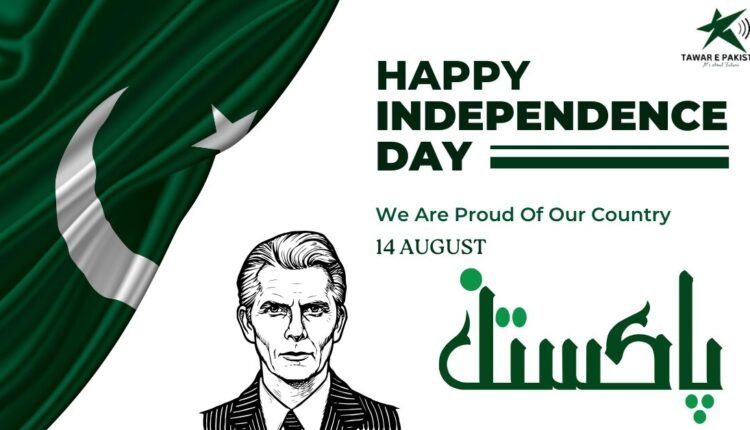Pakistan Independence Day 2025 – Honoring the Past, Shaping the Future
Pakistan celebrates its Independence Day on August 14 each year, marking the historic moment in 1947 when the country was born. Guided by the national motto “Unity, Faith, and Discipline”, the day is a tribute to decades of struggle, sacrifice, and vision.
Independence Day is more than a commemoration — it’s a reminder of what it means to be free. It symbolizes self-determination, cultural preservation, and national unity. Self-determination is the right to govern ourselves without external control. Cultural preservation is the protection of our language, traditions, and religious identity. National unity is bringing together diverse communities under the banner of one nation. At tawar-e-pakistan, we emphasize that independence is not static; it is a living responsibility that must be protected and strengthened daily.
History of Pakistan Independence Day
The creation of Pakistan stands as one of the most unique occurrences in modern history. For centuries, Muslims and Hindus lived together on the Indian subcontinent, but over time, religious, political, and social tensions grew. The introduction and spread of Islam in the region brought cultural richness but also sparked deep-rooted divisions. By the late 19th century, Muslims faced growing marginalization.
After the Indian Rebellion of 1857, the British Crown took direct control of the subcontinent under the British Raj. Over the next decades, Muslim leaders recognized the need to safeguard their community’s rights and identity. In 1906, the All-India Muslim League was formed, and soon after, leaders began advocating for a separate homeland.
The vision for Pakistan was powerfully articulated by Allama Muhammad Iqbal in his 1930 Allahabad Address. The name “Pakistan” first appeared in the 1933 pamphlet Now or Never. However, the dream might have remained an idea if not for the tireless efforts of Quaid-e-Azam Muhammad Ali Jinnah.
On February 20, 1947, British Prime Minister Clement Attlee announced plans to grant India full self-governance. The Mountbatten Plan soon followed, proposing the partition of British India into India and Pakistan. On August 14, 1947, Pakistan emerged as an independent state for Muslims of the subcontinent.
The journey, however, was painful. Partition was marked by mass migration, communal violence, and deep personal losses. Yet, despite the tragedy, Pakistanis persevered and began building their new nation with hope and determination.
Key Milestones in Pakistan’s Independence Journey
- 1858 – British Crown takes control of the subcontinent after the Indian Rebellion.
- 1906 – Formation of the All-India Muslim League.
- 1930 – Allama Iqbal proposes a separate homeland for Muslims.
- 1940 – Lahore Resolution strengthens the demand for Pakistan.
- 1947 – Independence achieved on August 14.
- 1948 – Quaid-e-Azam Muhammad Ali Jinnah passes away.
- 1956 – Pakistan becomes the Islamic Republic of Pakistan.
Traditions and Celebrations
Independence Day in Pakistan is celebrated with unmatched zeal and patriotism. The green and white flag is proudly displayed across streets, buildings, and homes. Cities are illuminated with decorative lights, fireworks brighten the skies, and national songs echo from every corner.
The main ceremony takes place in Islamabad, with the President and Prime Minister hoisting the national flag at the Parliament and Presidency buildings. Their speeches honor the sacrifices of the forefathers and inspire the nation toward progress. Across the country, flag-hoisting ceremonies, cultural programs, school events, parades, and exhibitions showcase the love for Pakistan.
Pakistan’s Significance in the World
- Home to the world’s largest volunteer ambulance service (Edhi Foundation).
- Location of the Karakoram Highway, often called the Eighth Wonder of the World.
- The world’s seventh-largest standing army.
- A country with unmatched natural beauty — from the peaks of K2 to the beaches of Gwadar.
- Birthplace of Malala Yousafzai, the youngest Nobel Peace Prize laureate.
Why Pakistan Independence Day Matters
Independence Day is more than just a celebration — it’s a reminder of the price of freedom and the responsibility it brings. It marks the triumph of unity over division, hope over despair, and determination over impossibility. It’s a day to remember that the struggle for Pakistan was not just political, but also deeply personal for millions who gave their lives, homes, and loved ones for the dream of a homeland.
The Message of tawarepakistan on Independence Day 2025
At tawarepakistan, we see Independence Day as both a celebration and a call to action. This is a time to remember the vision of Quaid-e-Azam and the sacrifices of those who came before us, but also to reflect on how we can shape the Pakistan of tomorrow.
Our message to every Pakistani this August 14 is simple:
- Protect our unity — Stand above divisions and work together for the nation.
- Strengthen our faith — Believe in our potential as individuals and as a people.
- Uphold discipline — Let honesty, respect, and responsibility guide our actions.
We pledge to contribute toward building a progressive, educated, and united Pakistan, where every citizen can live with dignity, opportunity, and hope. The torch of freedom handed to us in 1947 must be carried forward with pride and responsibility.
Happy 78th Independence Day from tawarepakistan — Pakistan Zindabad! 💚🇵🇰


Comments are closed, but trackbacks and pingbacks are open.